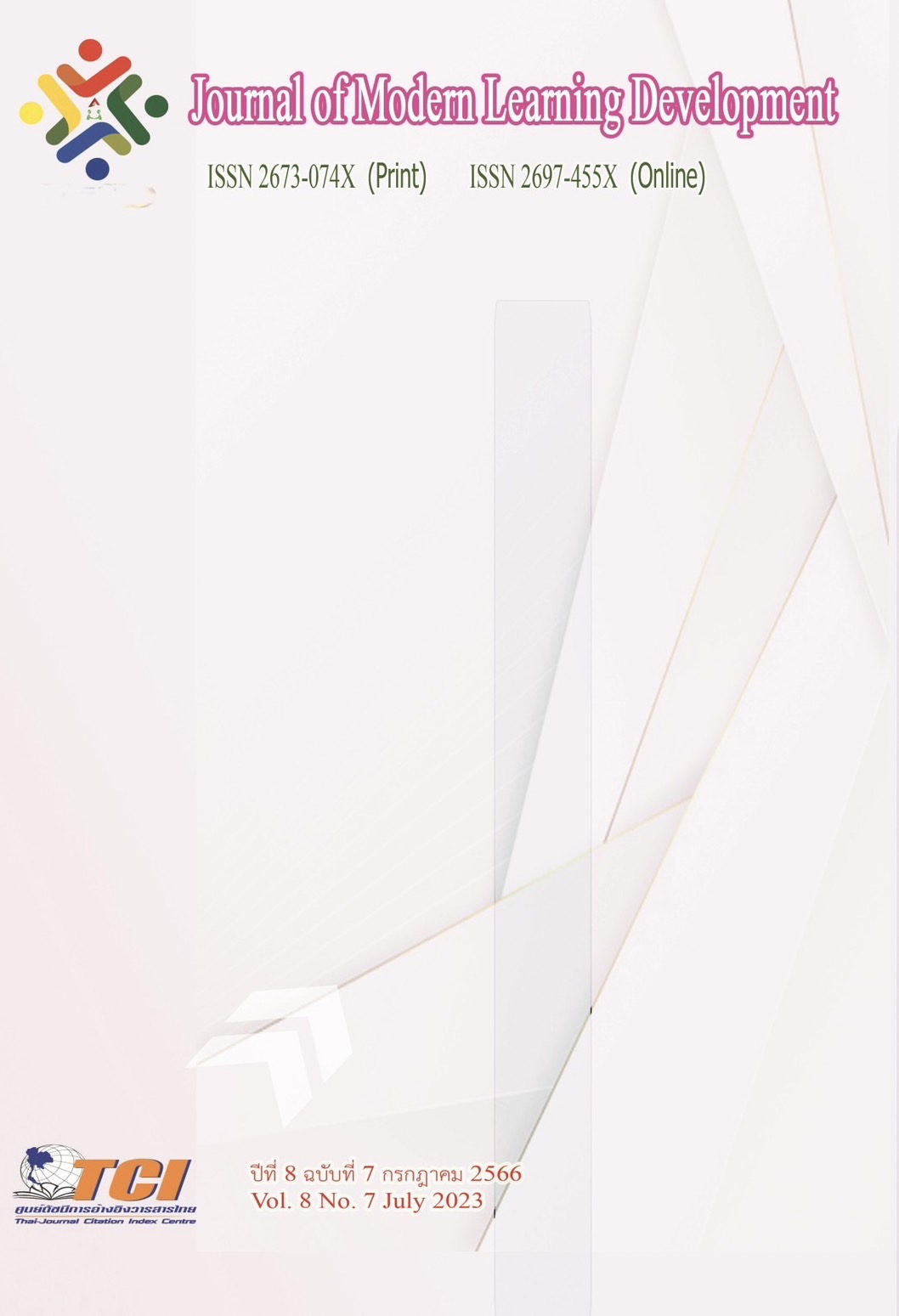The Teachers’ Ethical Development Model According to the Concept of the Philosophy of Sufficiency Economy of Wat Khum Kaew School Pathum Thani Primary Educational Service Area Office 2
Main Article Content
Abstract
The research objectives were; 1) to study the ethics of teachers. 2) To create and develop a teacher ethical development model according to the concept of the philosophy of sufficiency economy. Wat Khum Kaew School Pathum Thani Primary Educational Service Area Office 2, 3) To implementing model and 4) To evaluate the teacher ethics development model according to the concept of the philosophy of sufficiency economy of Wat Khum Kaew School Pathum Thani Primary Educational Service Area Office 2, The research method was used by participatory action research. (PAR), Participants are personnel in Wat Khum Kaeo School. Pathum Thani Primary Educational Service Area Office 2, totaling 19 people. The research results; as follows.
The teachers’ ethics according to the philosophy of sufficiency economy, have consists of 6 appropriate ethics as follows: 1) Economic sufficiency, 2). Teachers' spiritual, 3) Human Relationship, 4) Inspiration, 5) Cooperation and 6) Social responsibility or the "ETHICS Model". For the development of ethics in all 6 components, Their must be clear in following issues: 1) Ethics to be developed, 2) Objectives or goals, 3) Methods of action, and 4) Evaluation of development, and development activities were using on 1) seminars, 2) training meetings, 3) study visits, and 4) proper environment management. From the results of the assessment of accuracy, suitability, feasibility and usefulness by the experts, it was found that every issue was evaluated at a high level. And results using the development model, there were found the after development with Teachers’ ETHICS Model at Wat Khumkaew School have knowledge, understanding, attitude, and ethical behavior according to the Sufficiency Economy Philosophy were more than before development with Statistically significant at the .05 level.
Article Details
References
คชกรณ์ บัวคำ, สุวิมล โพธิ์กลิ่น และสมาน อัศวภูมิ. (2558). แนวทางการพัฒนาคุณธรรมและจริยธรรมของครูสังกัดสำนักงานคณะกรรมการการศึกษาขั้นพื้นฐาน. วิทยานิพนธ์ปริญญาดุษฎีบัณฑิต. บัณฑิตวิทยาลัย: มหาวิทยาลัยราชภัฏอุบลราชธานี.
ธัญญา ผลอนันต์. (2546). การมุ่งเน้นทรัพยากรบุคคลแนวทางการสร้างความพึงพอใจแก่พนักงาน. (พิมพ์ครั้งที่ 2). กรุงเทพมหานคร: อินโนกราฟฟิกส์.
บุญชม ศรีสะอาด. (2554). การพัฒนาการวิจัยโดยใช้รูปแบบ. ออนไลน์. สืบค้นเมื่อ 9 มกราคม 2566. แหล่งที่มา: http://www.watpon.com/boonchom/development.pdf
ประพันธ์ พลแพงขวา. (2555). รูปแบบการพัฒนาจริยธรรมครูเทศบาลภาค ตะวันออกเฉียงเหนือ. วิทยานิพนธ์ ค.ด. บัณฑิตวิทยาลัย: มหาวิทยาลัยราชภัฏอุดรธานี
รัติกรณ์ จงวิศาล และคณะ. (2559). ภาวะผู้นำ : ทฤษฎี การวิจัย และแนวทางสู่การพัฒนา (พิมพ์ครั้งที่ 3). กรุงเทพมหานคร: สำนักพิมพ์แห่งจุฬาลงกรณ์มหาวิทยาลัย
วสันต์ ปานทอง และคณะ. (2556). รูปแบบการพัฒนาครูเพื่อศิษย์ในสถานศึกษา สังกัดสำนักงานเขตพื้นที่การศึกษาประถมศึกษา. วารสารศึกษาศาสตร์ มหาวิทยาลัยนเรศวร. 15 (ฉบับพิเศษ), 193-205.
วีนันท์กานต์ รุจิภักดิ์ และเอมม่า อาสนจินดา.(2559). จริยธรรมในวิชาชีพครู = Ethics of the teachers' profession นครปฐม : สำนักพิมพ์มหาวิทาลัยมหิดล
สุภัทรา บุญปัญญโรจน์. (2550). ภาวะบริโภคนิยมของวัยรุ่นไทย : ปัจจัยผลักดันสู่สังคมไทย. วารสารรามคำแหง ฉบับมนุษยศาสตร์. 27 (1), 1-11.
สำนักงานเลขาธิการคุรุสภา. (2556). มาตรฐานวิชาชีพทางการศึกษา. กรุงเทพมหานคร: โรงพิมพ์ คุรุสภา.
Steiner, G. A. (1969), 'A Conceptual and Operational Model of Corporate Planning', in Top Management Planning, Toronto: Collier-Macmillan,


